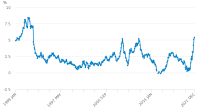Can I protect my savings and investments against inflation?
19th January 2022
-
Gavin Jones See profile
According to the Office for National Statistics (ONS), the rate of inflation has just hit the highest level in almost 30 years. Inflation, the change in the price of goods and services, as measured by the Consumer Prices Index (CPI) rose by 5.4% in the 12 months to December 2021. This is the highest CPI 12-month inflation rate in the National Statistic data series, which began in January 1997, and it was last higher in March 1992, when it stood at 7.1%.
Over the last thirty years, inflation has averaged about 2.5% per annum as you can see in the graph below so a rise of 5.4% over the last year is bound to get people’s attention.
It’s hard to find a consensus as to the causes of the current inflation spike. Some claim it’s driven by the supply chain disruption caused by COVID-19, others that it‘s purely a monetary phenomenon, with central banks largely to blame.
Consumer Prices Index from 1989 to 2021
Source: Office of National Statistics (ONS)

The impact of inflation on your savings
A return to inflationary times can spell bad news for people holding substantial sums on deposit where the difference between the interest earned and the real value starts to widen considerably. In December we saw the Bank of England (BOE) raise rates to 0.25% from their historic low of 0.10% but with inflation now running at over 5% per annum and not withstanding further rate rises may now be in the pipeline, the interest received on savings will go nowhere near compensating for the loss in real value as a result on this inflation increase.
Whilst the base rate rise has offered some hope to savers, so far there have only been a handful of financial institutions – banks and building societies that have put up savings rates. Institutions however have been quick to increase mortgage rates.
National Savings and Investments did increase their rates at the end of 2021, but this must be viewed in the context of large rate cuts for their accounts in 2020 and rates for their easy access savings account is only 0.35% pa.
Don’t risk short term money
The biggest issue of inflation is for those where investing or alternative options are not viable – short term commitments should never be invested to get an above inflation return, because short term volatility can cause greater losses than the erosion of buying power inflation will cause.
It’s always prudent to keep an emergency fund, be it six or twelve months of income, plus any amounts that are known will be needed in the coming couple of years – money for replacing cars, home improvements, gifts and suchlike. Once you ringfence those sums – and accept that they will not earn a competitive rate of return – the remaining funds should be considered as part of a long-term plan, and possibly invested to give a better return.
For those who have to keep large amounts of money on deposit – because the money is committed in the coming years for example – there is sadly little that can be done to protect against inflation. Searching around for more competitive rates of interest will lessen the impact as will choosing fixed rates for money that you don’t need instant access to, but we do not expect cash savings to keep pace with inflation in the short term. Economists are still largely predicting that inflation will fall as we go through 2022, but they also predicted inflation would start to fall away in the second half of 2021.
As a guide, competitive interest rates are as follows:
Instant access 0.6%
Notice account 1%
1 year fixed rate 1.36%
How investing can help protect against inflation
To protect the value of your wealth against inflation over the longer-term it’s necessary to invest into ‘real’ assets such as shares of companies or property. Beware the newspaper headlines that predict the best investments to protect against inflation – inflation is only one of the concerns you should be considering for your financial future and a more balanced portfolio is a better option.
The good news is that a diversified investment portfolio, like the one you have if you work with Old Mill, can protect against inflation. Broadly our portfolios protect against inflation as follows:
Growth assets
Equities and Global Commercial Property are generally expected to provide reasonable protection from inflation over the longer term, given that a company can increase its prices to customers and landlords are able to raise rents in line with inflation and the value of its assets in general, such as real estate, will rise too.
Defensive assets
Conventional shorter-dated bonds, such as gilts and high-quality corporate bonds can do a reasonable job of protecting portfolios from inflation as well, provided that actual inflation levels are in line with the bond market’s expectation. Our approach is to also include Inflation-linked bonds which provide a structural link to inflation indices, such as the UK’s Retail Price Index (RPI), as these offer better protection from unanticipated inflation than the short dated bonds described above.
Summary
Whilst savings accounts are something of a blunt instrument when it comes to dealing with inflation, there are fortunately alternative solutions for those able to take a longer-term investment view. Using a robust and diversified investment portfolio will give the opportunity and prospect of a higher return than a savings account with the aim of matching inflation plus providing a real rate of return over this.
We know that headlines about inflation can cause concern and if you would like to discuss the potential impact of this on your own financial affairs, one of our Financial Planners will be pleased to speak to you, or alternatively click here…

